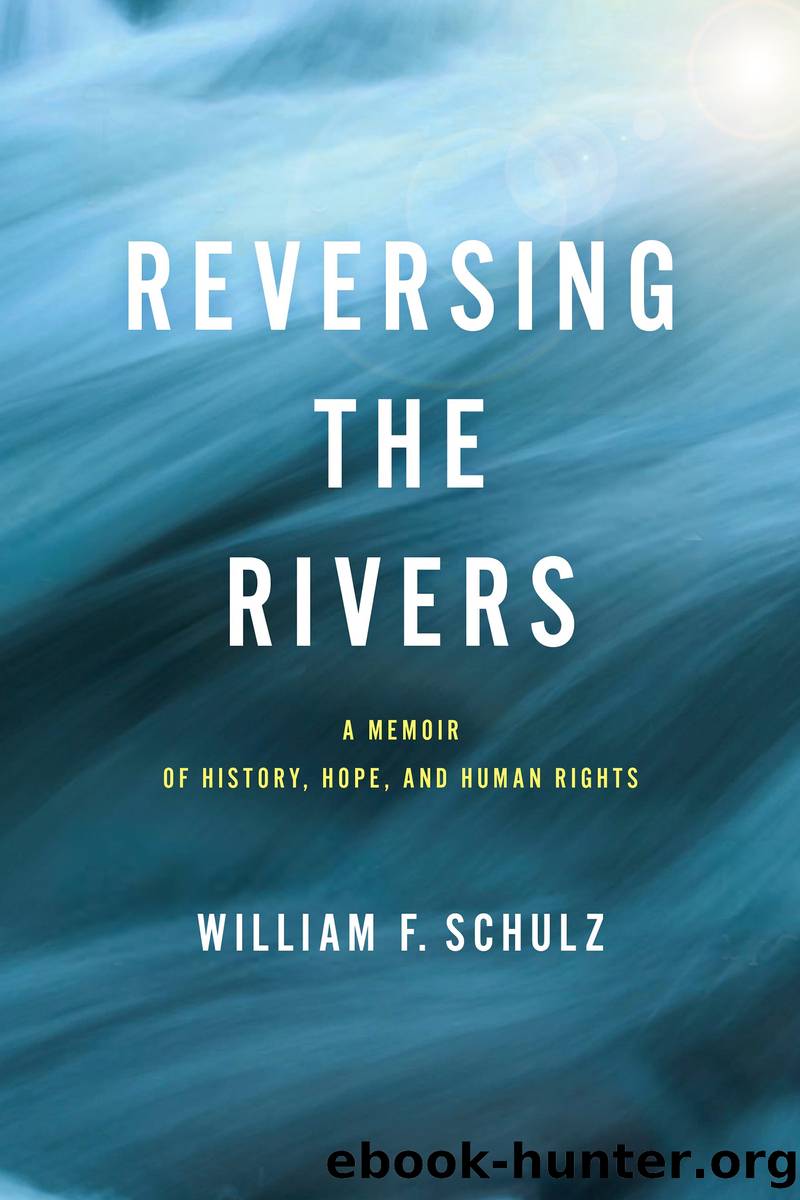Reversing the Rivers by William F. Schulz;

Author:William F. Schulz;
Language: eng
Format: epub
Publisher: Lightning Source Inc. (Tier 2)
* * *
Six days after 9/11, President Bush signed an executive order authorizing the CIA to capture and interrogate al-Qaeda members and others suspected of being involved in the attacks. Many months of legal debate within the administration ensued regarding the status of such captives and the permissible techniques that might be employed in such interrogations. These debates and their consequences have been widely documented42 and resulted in such now legendary sound bites as CIA counterterrorism chief Cofer Blackâs testimony to Congress that âthere was âbeforeâ 9/11 and âafterâ 9/11 and âafter 9/11â the gloves come offâ and Deputy Assistant Attorney General John Yooâs infamous memo of January 9, 2002, asserting that the president need not be bound by customary laws of war because they did not constitute federal law.43
Bush concurred with the conclusions of his most rabid advisers by issuing a memo to his top officials on February 7, 2002, which asserted that common article 3 of the Geneva Convention requiring the humane treatment of prisoners did not apply to either al-Qaeda or Taliban captives. He then went on to insist that, even so, âour values as a nation ⦠call for us to treat detainees humanely, including those who are not legally entitled to such treatment. Our nation has been and will continue to be a strong supporter of Geneva and its principles. As a matter of policy, the United States Armed Forces shall continue to treat detainees humanely and, to the extent appropriate and consistent with military necessity, in a manner consistent with the principles of Genevaâ (emphases added).44 Under the guise of reaffirming the traditional American commitment to respecting the rights of those in its custody, this finding created opportunities for brutality so obvious that even the biggest dullard could find a way to take advantage of them. It labeled such prisoners ineligible for humane treatment, which is dangerously close to labeling them âless than human,â a common precursor to torture. Its restrictions applied only to the US military, not the CIA, and not of course to other countries to which the United States would transfer these prisoners (âextraordinary renditionâ)âcountries like Syria, Egypt, Romania, and Polandâthat had far fewer scruples about applying âenhanced interrogation techniquesâ than the United States allegedly did.45 Best of all, it rendered all this talk of humane treatment null and void if someone (undesignated) found such treatment inappropriate or inconsistent (undefined) with âmilitary necessityâ (undelineated).
Little wonder then that beginning a few months later reports began leaking out that it was not only Guantánamo Bay to which terrorist suspects were being transferred but to so-called âblack siteâ prisons in countries that used torture to extract information more quickly than âmore benign interrogation methodsâ could accomplish.46 Little wonder that Human Rights Watch reported in 2002 US brutalization of prisoners, including homicides, committed at Bagram Air Base in Afghanistan.47 And little wonder that within slightly more than a year of Bushâs memo, Amnesty and other human rights organizations were getting word of mistreatment, including sleep
Download
This site does not store any files on its server. We only index and link to content provided by other sites. Please contact the content providers to delete copyright contents if any and email us, we'll remove relevant links or contents immediately.
| Civil Rights | Discrimination |
| General | Human Rights |
Day by Elie Wiesel(2594)
The Age of Genius by A. C. Grayling(2392)
Gideon's Spies: The Secret History of the Mossad by Gordon Thomas(2237)
The Gulag Archipelago (Vintage Classics) by Aleksandr Solzhenitsyn(1985)
FATWA: Hunted in America by Pamela Geller(1926)
Columbine by Dave Cullen(1766)
Men Explain Things to Me by Rebecca Solnit(1606)
The Rule of Law by Bingham Tom(1593)
Examples & Explanations: Administrative Law by William F. Funk & Richard H. Seamon(1550)
Anatomy of Injustice by Raymond Bonner(1530)
Three Cups of Tea by Greg Mortenson(1517)
That Every Man Be Armed by Stephen P. Halbrook(1479)
ADHD on Trial by Michael Gordon(1471)
The Source by James A. Michener(1458)
Gideon's Spies by Gordon Thomas(1424)
Future Design by Unknown(1385)
Palestinian Walks by Raja Shehadeh(1362)
Constitutional Theory by Carl Schmitt(1346)
Fast Times in Palestine by Pamela Olson(1333)
